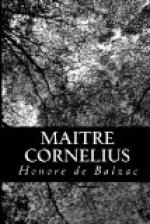“The devil is amusing himself at the expense of our crony, the torconnier,” said Louis XI. to his barber, a few days before the festival of All-Saints. “He says he has been robbed again, but he can’t hang anybody this time unless he hangs himself. The old vagabond came and asked me if, by chance, I had carried off a string of rubies he wanted to sell me. ‘Pasques-Dieu! I don’t steal what I can take,’ I said to him.”
“Was he frightened?” asked the barber.
“Misers are afraid of only one thing,” replied the king. “My crony the torconnier knows very well that I shall not plunder him unless for good reason; otherwise I should be unjust, and I have never done anything but what is just and necessary.”
“And yet that old brigand overcharges you,” said the barber.
“You wish he did, don’t you?” replied the king, with the malicious look at his barber.
“Ventre-Mahom, sire, the inheritance would be a fine one between you and the devil!”
“There, there!” said the king, “don’t put bad ideas into my head. My crony is a more faithful man than those whose fortunes I have made —perhaps because he owes me nothing.”
For the last two years Maitre Cornelius had lived entirely alone with his aged sister, who was thought a witch. A tailor in the neighborhood declared that he had often seen her at night, on the roof of the house, waiting for the hour of the witches’ sabbath. This fact seemed the more extraordinary because it was known to be the miser’s custom to lock up his sister at night in a bedroom with iron-barred windows.
As he grew older, Cornelius, constantly robbed, and always fearful of being duped by men, came to hate mankind, with the one exception of the king, whom he greatly respected. He fell into extreme misanthropy, but, like most misers, his passion for gold, the assimilation, as it were, of that metal with his own substance, became closer and closer, and age intensified it. His sister herself excited his suspicions, though she was perhaps more miserly, more rapacious than her brother whom she actually surpassed in penurious inventions. Their daily existence had something mysterious and problematical about it. The old woman rarely took bread from the baker; she appeared so seldom in the market, that the least credulous of the townspeople ended by attributing to these strange beings the knowledge of some secret for the maintenance of life. Those who dabbled in alchemy declared that Maitre Cornelius had the power of making gold. Men of science averred that he had found the Universal Panacea. According to many of the country-people to whom the townsfolk talked of him, Cornelius was a chimerical being, and many of them came into the town to look at his house out of mere curiosity.




